
Caribbean Journalists in Lima: Making Climate Change Real
November 12th, 2014
When the term “climate change” is mentioned, some people’s eyes glaze over. Others suppress a sigh.
The truth is, many of us in the Caribbean and beyond still find the topic obscure and confusing. It is science – and not particularly straight forward science, either. There are uncertainties and contradictions, different theories and perspectives. Some are still not sure it’s really happening. However, we should all know by now that, yes – it is right here. Right now.
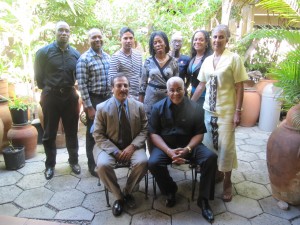
Journalists from five Caribbean countries (apart from Jamaica) pose for their photo with (sitting, left) Dr. Arun Kashyap, Resident Representative/United Nations Development Program and Minister of Water Land Environment and Climate Change Robert Pickersgill; (center) Indi McLymont Lafayette/Panos Caribbean and (far right) Judith Wedderburn, FES.
A key goal of the two-day journalist training program organized last week by the Friedrich Ebert Stiftung (FES) and Panos Caribbean in Kingston was to help Caribbean journalists interpret the vagaries of climate change for their public. Interpretation is what investigative journalists do – whatever the topic. Explaining, clarifying, offering examples, stories to think about. One of the challenges of “environmental reporting,” however, seems to be that it is not easily sustained. A headline-grabbing political drama or a scandal can easily push environmental stories to the back pages. It can all go off the boil for a while, until the next natural disaster or disturbing event (sewage leaks in the city of Kingston, a fish kill or an unexpected storm). How can journalists keep these issues – which are, in fact, very much everyday concerns – continuously in the public eye, raising awareness?
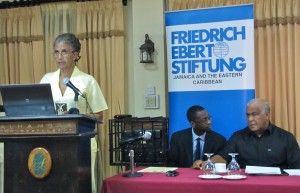
Judith Wedderburn of Friedrich Ebert Stiftung welcomes participants to the National Consultations on Climate Change on November 6. Seated are (left) Dr. Orville Grey, Senior Technical Officer in the Climate Change Division; and Minister of Water Land Environment and Climate Change Hon. Robert Pickersgill.
Another objective of the training was to provide information on Jamaica’s participation in the upcoming Conference of Parties (COP) to the UN Framework Convention on Climate Change (UNFCCC). The Conference (COP-20) will take place in Lima from December 1 – 12, 2014. Ah, and now we run into another challenge in reporting climate change. We run into all these acronyms! They are part and parcel of these tremendously important international negotiations. But a newspaper or broadcast media report liberally sprinkled with COP, UNFCCC, GEF (and a whole lot more) can be quite disconcerting for the reader, distracting from the main issue at hand.
Last week’s workshop included a well supported National Consultation on Climate Change, organized jointly by the Ministry of Water, Land, Environment and Climate Change, the United Nations Development Programme and FES, and attended by Minister Pickersgill himself. Jamaica’s negotiator at the international climate change meetings Clifford Mahlung was especially illuminating in his comments. He gave us a glimpse into the exhausting, unglamorous, often contentious world of climate negotiations: sleeping on chairs (or no sleep at all); all-night sessions; unanticipated obstacles; trying to physically track down groups and individuals in a global maze of corridors and hallways. And crucially, it is very hard to make the voice of the Caribbean and other Small Island Developing States (yes, another acronym – SIDS!) heard in the din, when there are so very few representatives. How do you split yourself in several parts, in order to attend all the important discussions that you need to hear?
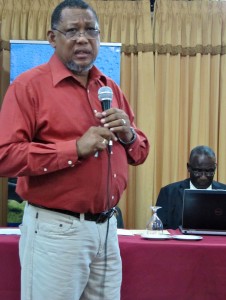
Intrepid Jamaican climate change negotiator and head of the Climate Branch at the Jamaica Meteorological Service Clifford Mahlung. In the background is Albert Daley, Principal Director of the Climate Change Division, who also gave an honest and forthright assessment of Jamaica’s climate change priorities.
By the way, I wondered why the vast majority of climate change negotiators are men. Are women not considered “tough” enough?
Media seeking to cover the COP have similar experiences. Most of the journalists at the training workshop had already attended some of the meetings. The first week is for the technical people, I understand; the second is where the politicians come in – and often turn things upside down. Journalists “must write about what is happening” at these meetings, said Petre Williams Raynor of Panos Caribbean, herself a journalist. They must also understand what issues people in Jamaica, Barbados or St. Vincent care about. Tell stories, human stories. Readers can read up about what was decided online or learn on international news; but they want stories that are relevant to their own countries, their issues. By the way, the UNFCCC has a really cool website (http://newsroom.unfccc.int/about/) which will keep you up to date on all aspects of the COP – and all the issues involved. It’s well worth bookmarking and excellent background information.
The Association of Small Island States (AOSIS) – CARICOM states are members, even those that are not actually islands – must develop stronger relations with the media, it was noted. Journalists must engage them, and they must be strategic. There are so many people to talk to – potentially thousands. Panos suggested that the journalists socialize and network at COP-20, and attend side events – keeping in mind those all-important Caribbean issues.
And how were the journalists at the workshop? As engaged and intelligent a group of media practitioners as I could ever hope to meet, from Jamaica, Barbados, Antigua, St. Vincent, St. Lucia and Guyana. A freelance journalist from Guyana expressed disappointment that there was not a more robust discussion during the National Consultations, and it did appear that there were many government agencies and ministries in attendance – officials who had perhaps been told they must attend! However, there were good questions from some representatives of youth organizations; the Jamaica Junior Chamber’s Adrian Watson posed an important question about deforestation. After the Consultations the journalists discussed possible stories coming out of the sessions; they were many and varied. Do read them when you see them.
The small, anxious voice of the Caribbean must be heard. CARICOM negotiators are meeting next week (November 19-20) in St. Kitts to prepare for the Lima conference. I wish them all luck. With people like Mr. Mahlung at the forefront, I have faith that Caribbean concerns in Lima will be well represented. It is, after all, “crunch time,” with a new agreement to be signed at the next COP in Paris in December 2015. I must just remind Mr. Mahlung to stock up on his vitamin supplements, in advance! He might need extra stamina, this time around.
And I know the Caribbean journalists will be well-equipped to tell those climate change stories. Listen to them.
Tags: Association of Small Island States, Caribbean, CARICOM, Clifford Mahlung, Climate Change, COP-20, Friedrich Ebert Stiftung, Jamaica, journalism, Kingston, Lima, Ministry of Water Land Environment Climate Change, Panos Caribbean, Robert Pickersgill, Small Island Developing States, training, UN Framework Convention on Climate Change, UNFCCC, United Nations Development Programme
The Gleaner reserves the right not to publish comments that may be deemed libelous, derogatory or indecent.
To respond to The Gleaner please use the feedback form.
5 Responses to “Caribbean Journalists in Lima: Making Climate Change Real”
- We Are the Zoomers
- Living Online with Humans and Birds: NAOC 2020
- Human Trafficking and the Problem of Public Education
- Down Memory Lane
- Are We Ready to Recover from COVID-19?
- Road Safety Matters: Is Your Vehicle Safe?
- Sexual Harassment, Me Too, and the Minister’s Disturbing Giggle
- The Vulnerable Senior Citizens, Private Care Homes and COVID-19
- A Muddle Over Masks
- Here is Something Life-Saving You Can Do: Give Blood!

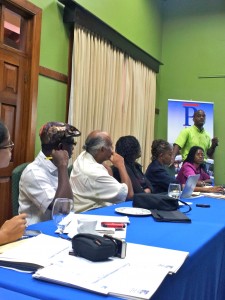
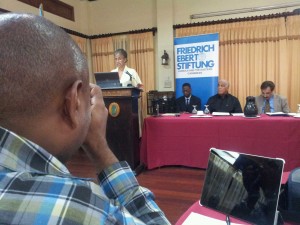


Fine to find all reporter people learn how to give information about climate change, on a properly way, but how to do it really well if UN has choose a arbitrary commodity unity: equivalent CO2 Tons , as the way to talk and negotiate Clima(a statistic by definition), in my eyes no way, the proof 20 years and none advance.
A more direct way to help nature recover, with a concrete discussion to arrive to solutions is using energy fluxes and his accumulation, to stop the global heating, speaking-negotiating on International System of unities, so using normal-scientific language, and not arbitrary market units.
I really hope some people make advice of importance to use correct language to communicate and try to arrive solutions easily, and not with bizarre(carbon) imposed language.
Good report about matters we need to be aware of! Thanks
[…] Last week I attended a media training session for Caribbean journalists and the National Consultation on Climate Change. I wrote a piece in my weekly Gleaner blog “Social Impact” here, which you might enjoy. Please leave a comment on the page if you would like! http://gleanerblogs.com/socialimpact/?p=2331 […]
Thank you, Barbara! It is going to be an uphill struggle for developing states, and especially small island states, at the climate talks.
Yes, I agree. Language is certainly an issue, and I hinted at that in my article. The Caribbean journalists have already produced some articles coming out of this training workshop and I have to say that they are getting quite good at “translating” the technical/scientific jargon into more accessible language.